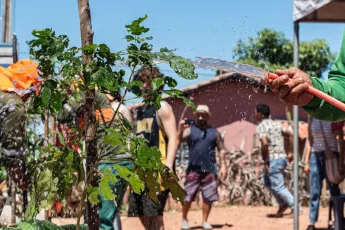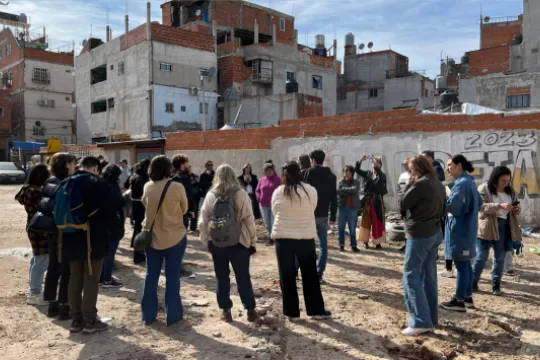
Supporting cities in achieving climate-friendly and just futures. © Paulo Sérgio / WRI Brasil
How can cities radically decrease their carbon emissions while addressing rampant inequalities?
Why should local residents care about their city’s carbon footprint when their electricity is unstable and the street floods every time it rains?
Can the municipal housing department, health department, and environmental protection office constructively work with local business owners, grassroots political groups of diverse party affiliation, and civil society organizations to design and implement transformative climate solutions?
These are just a few of the questions diverse stakeholders of urban laboratories in Argentina, Brazil, and Mexico are asking as they pioneer collaborative climate action in five cities in cooperation with.
Based on a logic of collaborative and inclusive climate governance, the Labs designed and implemented catalyst projects that promote zero-carbon trajectories as well as responded to development needs of local populations. For example, the Buenos Aires Urban Lab in Barrio 20 has integrated nature-based solutions and recycled building materials with a large-scale informal settlement upgrading intervention.
Cities are the sites of roughly two thirds of global carbon emissions. To avoid catastrophic effects of climate change, urban emissions must rapidly decline to align with net-zero strategies. In the fact of this challenge, urban decision-makers and experts call for greater collaboration — the ‘all hands on deck’ or ‘whole society’ approach to transformation.
Zero-carbon strategies and pathways to net-zero are hardly straightforward
Mayors and governments face competing interests and limited resources; and environmental and climate departments are often siloed in comparison to economic and infrastructure planning departments. In response, experts have driven forward a number of innovative governing frameworks and approaches: vertical integration, multi-level policy coordination, collaborative governance, integrated climate action and climate resilient development, to name a few. Around the world and across scales, significant knowledge gaps and challenges to implementation hinder progress.
Policy briefings, guidebooks, and case studies can be helpful; but the complexity and diversity cities calls for experimentation, innovation, and a learn-by-doing approach. In such situations, learning from peers and exchange can be an important tool. City-to-city partnerships and horizontal exchanges can strengthen and extend locally produced knowledge and create networks of solidarity between actors with shared agendas. Within the context of international development, exchanges between recipients of development aid (South-South cooperation) can decentre North-South power hierarchies and recognize the value of knowledge-sharing and capacity development among experts, institutions and civil society within the Global South.
Recognizing the importance of exchange, TUC invested in a Community of Transformation. This cross-project mechanism is based on Communities of Practice, instruments to foster social learning within a group or association of actors with shared interests and complimentary capacities. They may be organically or intentionally formed and organized. Most CoPs, especially those organized for professionals, focus on improving existing practices through sharing capacities and demonstrating specific know-how. They seek to improve rather than transform the status quo. In contrast, the TUC Community of Transformation is actively focused on impact, with the objective to support transformative change through specific community, policy and material processes. Borrowing from the field of education, we may define Communities of Transformation as intentional social learning spaces “that create and foster innovative spaces that envision and embody a new paradigm of practice.”
The TUC Community of Transformation emerged from calls for cross-consortium learning and exchange, especially between the Urban Labs, and is a collaborative and flexible mechanism co-produced with consortium members that operates across the project’s work packages. The priority of the Community of Transformation is to facilitate learning and exchange among stakeholders regarding collaborative and inclusive pathways towards decarbonization. Aligned with TUC’s commitment to inclusive and just cities, the Community of Transformation aims to bridge gaps between stakeholders and diverse social, economic and environmental agendas.
Over the past two years, the Community of Transformation has hosted a mix of in-person and virtual events. Early exchanges focused on establishing Urban Labs and diverse means of collaboration and participation. After Urban Labs were up and running in all five cities, exchanges served to inform Lab members of the activities and focus across the cities, discuss common challenges and creative shared narratives of urban transformation.
Invaluable knowledge and insights have been acquired over the years
A key objective and added value of the Community of Transformation is that it provides spaces for different kinds of knowledge and learning compared to status quo policy and academic platforms, which value novelty and innovation above local and traditional knowledges. Importantly, social learning and exchange can offer motivation and inspiration to actors as well as identity capacity sharing opportunities.
Challenges to operating the Community of Transformation include speaking across different languages and governing cultures. While technology offers increased opportunities for virtual exchanges, these platforms have their limits. Beyond “Zoom fatigue,” access to technology and stable internet connections is not universal. For in-depth sharing and collaboration, in-person workshops and field site visits are incomparable.
Scale is a common barrier to transformation
Successful pilot projects or community-initiatives struggle to replicate or grow to encompass the whole city. The Urban Labs in the TUC project therefore designed catalyst projects with the intention of scaling up through diverse pathways. As the project moves look ahead, this will be a principal objective and a challenge for the Community of Transformation to address. Some coalition partners are already experimenting with diverse paths to scaling. Coalition partner IIED-América Latina is leading regional inspiration and sharing workshops with municipal governments and civil society organizations from around the country. The World Resources Institute-Brazil is collaborating with the National Ministry of Cities to write a guidebook for Urban Labs and collaborative climate action in favelas, Brazilian informal settlements. This will support the development off 30 new Urban Labs in cities across the country.
The TUC Community of Transformation will continue to facilitate learning exchanges between Urban Labs. We are also interested in learning from new geographies and initiatives from throughout the Latin American region and beyond.
